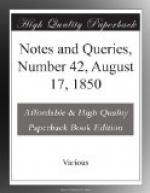S.W.
“A frog he would” &c. (Vol. ii., p. 45. and elsewhere).—I remember, when a boy, to have heard an old aunt repeatedly sing this song; but the chorus was very strange.
“A frog he would a-wooing ride,
With a rigdum bullydimy kymy;
With sword and buckler by his side,
With a rigdum bullydimy kymy.
Kymyary kelta cary kymyary kymy,
Strimstram paradiddle larrabona
ringting,
Rigdum bullydimy kymy.”
A.
City Sanitary Laws (Vol. ii., p. 99.).—The act of Parliament prohibiting the slaughter of cattle within the city, referred to in the passage from Arnold’s Chronicle, extracted by your correspondent T.S.D. is the 4 Hen. VII. c. 3., which enacts that—
“No butcher shall kill any flesh within his scalding-house, or within the walls of London, in pain to forfeit for every ox so killed 12d. and for every other beast 8d., to be divided between the king and the prosecutor.”—Bohun’s Privilegia Londini 1723, p. 480.
Brydall, in his Camera Regis (Lond. 1666, p. 114.), quotes the statute of 11 Hen. VII. c. 21, as the authority for the “singularity” attaching to the city, that “butchers shall kill no beasts in London.” I believe, however, Bohun’s reference will be found to be the correct one. The statute in question has, I think, never been repealed; but in the absence of abbatoirs, or other proper provision for the slaughtering of cattle without the walls of the city, it seems doubtful whether the {189} pains and penalties to which the “contrary doers” were liable, were at any time strictly enforced.
JAMES T. HAMMACK.
Sanitary Laws of other Days (Vol. ii., p. 99.).—The statute referred to by T.S.D. in his article, by which “it is ordeigned y’t no such slaughter of best shuld be used or had within this cite,” was no doubt 4 & 5 Henry VII. c. 3., intituled “An Act that no Butcher slea any Manner of Beast within the walls of London.” The penalty is only twelvepence for an ox or a cow, and eightpence for any smaller animal. The act itself seems unrepealed, but the penalties are too small at the present day to abate the nuisance.
C.R. SOC.
Michael Scott, the Wizard (Vol. ii., p. 120.).—I have now lying before me a small duodecimo, Lugdini, 1584, entitled—
“Alberti Magni de Secretis
Mulierum libellus, scholiis auctus et
a mendis repurgatus,”
to which is appended a work of the wizard’s “ob materiae similitudinem,”
“Michaelis Scoti philosophi De Secretis Naturae Opusculum.”
E.S.T.
Clerical Costume (Vol. ii., p. 22.).—Possibly the answer to this Query may be found in the passage from Bacon’s History of Life and Death, in the third part of the Instauratio Magna, which I copy below from Craik’s Bacon and his Writings, vol. iii. p. 45.:—




